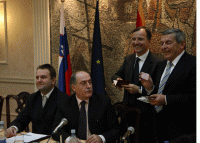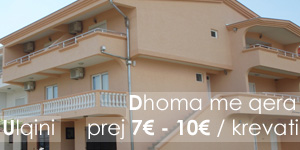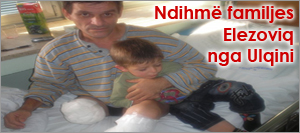Crna Gora blizu ukidanja viza
 22.02.2008-Potpredsjednik Evropske komisije Franko Fratini kazao je ju?e da ?e Brisel tokom pregovora o liberalizaciji viznog režima svaku državu Zapadnog Balkana vrednovati pojedina?no, istovremeno ocjenjuju?i da je Podgorica “postigla zna?ajne rezultate” u oblastima vezanim za ovaj proces.
22.02.2008-Potpredsjednik Evropske komisije Franko Fratini kazao je ju?e da ?e Brisel tokom pregovora o liberalizaciji viznog režima svaku državu Zapadnog Balkana vrednovati pojedina?no, istovremeno ocjenjuju?i da je Podgorica “postigla zna?ajne rezultate” u oblastima vezanim za ovaj proces.
Štampa piše da je to ohrabrilo ministra unutrašnjih poslova i javne uprave Jusufa Kalamperovi?a da na po?etku pregovora o liberalizaciji viznog režima izrazi nadu da ?e državljani Crne Gore do kraja godine putovati bez viza u 24 države šengen zone.
“Mi ?emo svaku zemlju posmatrati pojedina?no, zavisno od zasluga. Zato sam ja danas ovdje. Mislim da je Crna Gora postigla važne uspjehe i rezultate, kao što je usvajanje novog Ustava, borba protiv organizovanog kriminala…”, rekao je Fratini koji je sa premijerom u ostavci Željkom Šturanovi?em otvorio prvi dijalog o liberalizaciji viznog režima izme?u Crne Gore i EU.
Na sastanku u vili “Gorica” kojem su prisutvovali predstavnici Vlade Crne Gore i Evropske komisije (EK) i koji je bio otvoren za novinare, Fratini je objasnio da Brisel na “mapi puta” ka liberalizaciji viznog režima ocjenjuje uspjehe iz ?etiri podru?ja.
To su bezbjednost li?nih isprava, borba protiv nelegalne imigracije, javna bezbjednost i kriterijumi koji se odnose na spoljnu politiku. “Vi ste postigli zna?ajne rezulate u svim ovim podru?jima”, ocijenio je Fratini i podsjetio da ?e u Crnoj Gori do kraja aprila po?eti izdavanje novih pasoša i li?nih karata sa biometrijom.
“To je jedan od jasnih rezultata, tako da mogu da kažem da je Crna Gora na pravom putu”.
Kalamperovi? je evropskom komesaru uru?io model budu?eg crnogorskog pasoša, kao i zakone i predloge zakona od ?ije primjene i usvajanja zavisi liberalizacija viznog režima.
On je Fratiniju, strastvenom filatelisti, poklonio sve primjerke poštanskih markica koje su izdate u Crnoj Gori od proglašenja nezavisnosti.
| 21.02.2008 |
Minister Mate on Security as a Common Good and on Visa Liberalisation with Montenegro |
|
Dragutin Mate, Slovenian Minister of the Interior and President of the Justice and Home Affairs Council, attended the fifth annual ministerial conference on cooperation on border security in the Western Balkans, held in Budva, Montenegro and organised by the Ministry of the Interior and Public Administration of Montenegro and the Geneva Centre for the Democratic Control of Armed Forces (DCAF). |
|
The fifth annual ministerial conference under the auspices of the Geneva DCAF is devoted to the evaluation of progress achieved and activities carried out in 2007 as part of the DFAC Border Security Programme 2008–2011. DCAF programmes focus on a broad spectrum of public security issues. The DFAC Border Security Programme, which is one of its active programmes, began to be implemented in November 2001. Its objectives include enhancing security and cooperating in efficient border control in the Western Balkan region. Minister Mate stated that, despite the fact that each country exercises its functions on its own side of the border, “we are all on the same side of the border when it comes to combating all forms of crime, terrorism and other security risks. This increased awareness is reflected in specific activities and reinforced police and border police cooperation regardless of the origin of police forces.” The countries in the region have already concluded a number of agreements on cross-border police cooperation. In this context Minister Mate underlined that “the switch from bilateral cross-border cooperation to regional cross-border cooperation is of great significance. The signing of the modern and comprehensive Police Cooperation Convention for Southeast Europe means genuine progress, not only benefiting the populations of the contracting parties but with much wider favourable effects. The fact that some countries in the region have already ratified the Convention is a strong message that the region is willing and able to raise the level of security while ensuring fundamental human rights and brings to the region the latest standards applicable in the EU Member States.” The Geneva DCAF, in cooperation with Austria and Slovenia, actively supports activities aimed at setting up capacities and implementing the Police Cooperation Convention for Southeast Europe, which was signed on 5 May 2006 in Vienna. Further, at the conference Minister Mate signed a Cooperation and Partnership Agreement between the Ministry of the Interior of the Republic of Slovenia and Geneva Centre for the Democratic Control of Armed Forces. As part of his visit, Minister Mate also joined Franco Frattini, Vice-President of the European Commission and European Commissioner for Justice, Freedom and Security, who today in Podgorica announced the beginning of dialogue on visa liberalisation with Montenegro. Slovenia supports dialogue with the Western Balkan countries, as this will contribute to their timely drawing closer to the European Union.
LE MINISTRE DE L’INTERIEUR SLOVENE, M. DRAGUTIN MATE
M. Dragutin Mate, ministre slovène de l’Intérieur présidant actuellement le Conseil des affaires intérieures de l’UE, a participé à Budva, au Monténégro, à la cinquième conférence ministérielle annuelle sur la coopération dans le domaine de la sécurité frontalière dans la région des Balkans occidentaux Cette réunion était organisée par le Ministère monténégrin de l’Intérieur et de l’administration publique et le Centre pour le contrôle démocratique des forces armées (DCAF) de Genève. A cette occasion, M. Mate a tenu les propos suivants au nom de la présidence slovène du Conseil de l’UE : « La sécurité n’est pas une valeur qui peut être réduite au territoire d’un seul pays, la situation d’un pays en matière de sécurité ayant des incidences sur la sécurité d’une région, d’un continent et même à l’échelle mondiale. Nous ne voulons pas que l’Union européenne et l’espace Schengen soient considérés comme des forteresses. À cet effet, la Slovénie a fait du renforcement de la sécurité et de la liberté dans les Balkans occidentaux une priorité de sa présidence.» La cinquième conférence ministérielle annuelle sous l’égide de l’organisation DCAF est destinée à l’évaluation des progrès et des activités réalisés en 2007 dans le cadre du Programme DCAF relatif à la sécurité frontalière 2008 – 2011. Les programmes DCAF couvrent un spectre large de la sécurité publique. Un des programmes en cours, initié au mois de novembre 2001, est intitulé « DCAF’s Border security program ». Il est destiné au renforcement de la sécurité et de la coopération, ceci devant assurer un contrôle plus efficace des frontières dans la région des Balkans occidentaux. Bien que chaque pays effectue ses missions dans le cadre de ses frontières nationales, M. Mate a assuré que :« nous avons de plus en plus conscience d’être du même côté dans la lutte contre toute forme de criminalité, de terrorisme et les autres risques menaçant notre sécurité. Cette sensibilisation accrue est suivie d’actions concrètes et d’une coopération renforcée entre les forces de polices nationale et frontalière de toutes origines. » Les pays de la région ont déjà conclu beaucoup d’accords relatifs à la coopération policière transfrontalière. Sur ce point, M. Mate a évoqué que « le passage du niveau bilatéral au niveau régional dans le domaine de la coopération policière était d’une grande importance. La signature d’une convention moderne et complète relative à la coopération policière dans l’Europe du Sud-Est constitue un progrès remarquable. Elle a des effets bénéfiques non seulement pour la population des parties contractantes mais aussi à une échelle plus large. La ratification de cette convention par certains pays de la région est porteuse d’un message politique fort : celui qui affirme la volonté et les capacités de la région à œuvrer pour accroître son niveau de sécurité, tout en respectant la garantie des droits fondamentaux de l’homme et les standards de l’UE ». En coopération avec l’Autriche et la Slovénie, le DCAF soutient de manière intensive les activités en vue de l’application de la Convention relative à la coopération policière dans l’Europe du Sud-Est, signée le 5 mai 2006 à Vienne. Lors de cette conférence, M. Dragutin Mate a signé le Mémorandum de coopération et de partenariat entre le Ministère de l’Intérieur de la République de Slovénie et le Centre pour le contrôle des forces armées de Genève. Lors de sa visite, le ministre slovène, M. Mate, a également rejoint le Vice-président de la Commission européenne et le commissaire européen en charge des affaires relevant du domaine de la « Justice, Liberté et Sécurité », M. Franco Frattini. Ce dernier a annoncé, aujourd’hui à Podgorica, l’ouverture du dialogue relatif à la libéralisation du régime des visas avec le Monténégro. La Slovénie soutient l’ouverture du dialogue avec les pays des Balkans occidentaux, ce qui facilitera leur rapprochement avec l’UE.
|
| <- Back to: Slovene Presidency of the EU 2008 |

 Minister Mate
Minister Mate 




